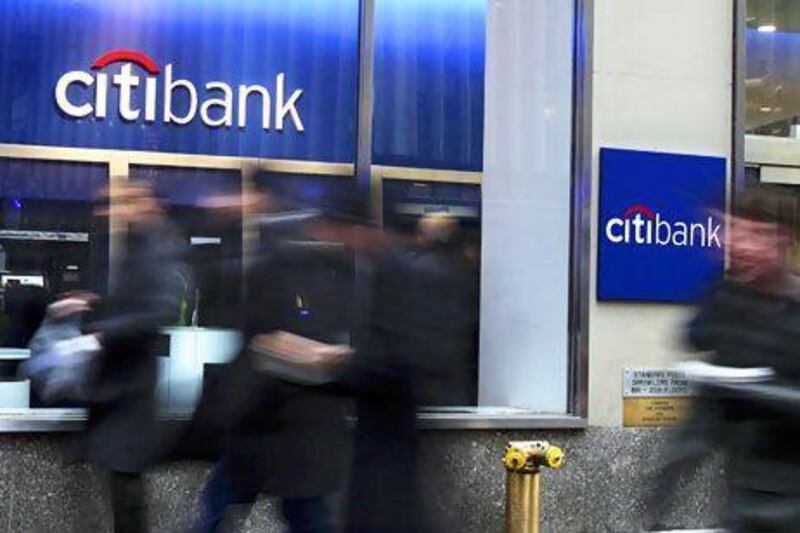Citibank has withdrawn from the panel that sets the UAE's interbank rates, becoming the second global bank to stand down in the aftermath of the scandal around London Interbank Offered Rates, or Libor.
The American banking giant follows Britain's Barclays, which in July announced it would leave the panel that sets the Emirates' equivalent benchmark, known as Eibor.
The move raises questions over the future of the Emirates' banking reference rate, as increasing numbers of banking regulators seek to move away from the discredited Libor system following a scandal which led to US$2.5 billion in fines for global banks and a string of arrests.
Citibank agreed to withdraw from the panel of 12 banks that sets Eibor rates at their latest meeting in April, the Central Bank said in a statement released yesterday.
"The meeting discussed Citibank NA's request to withdraw from the panel, in line with its globally implemented policy. After due deliberation, the panel accepted the request," the Central Bank said.
"The Eibor panel also decided that it will keep its membership at 11 banks instead of 12 banks. Therefore, from June 25 onwards, Eibor fixings will be based on submissions by 11 banks, and the average fixing will be calculated after excluding the two highest and the two lowest rates."
A Citibank spokesman declined to comment.
The Central Bank also said that it would drop the two-month Eibor rate, but that the panel will start submitting overnight interbank borrowing rates from the end of this month.
Barclays' withdrawal from the Eibor panel last year raised questions about how many banks had the requisite size, liquidity and depth of expertise to replace it. The Central Bank later appointed National Bank of Fujairah as a replacement.
Neither Citi nor Barclays have been accused of tampering with Eibor rates. However, both have withdrawn from rate-setting panels across the world including the Japanese and European panels which set the Tibor and Euribor rates.
In the past year, global banks have paid fines totalling $2.5bn to settle lawsuits stemming from the rate-rigging scandal surrounding Libor rates.
Regulators said trading floors had conspired to manipulate the interest rates that underpin trillions of dollars worth of financial products, from airline-leasing deals and derivatives to mortgages and credit cards.
Barclays' settlement with regulators in the United States for its role in the Libor scandal totalled $453 million, and led to the resignation of the bank's chairman and chief executive.
UBS and Royal Bank of Scotland also paid billions of dollars to regulators to settle claims against them.
Last December, the United Kingdom's Serious Fraud Office made three arrests of bank employees linked to the Libor case. Bloomberg News reported at the time that one of them was a former Citigroup trader.
Bankers frequently complain that the UAE's interbank rates do not reflect the actual cost of funding and have long called for an overhaul.
In other markets, banks typically price financial products using Libor plus an agreed margin.
The perceived inconsistency of Eibor with banks' real funding costs has led many banks, including Abu Dhabi Commercial Bank and Standard Chartered, to use internally-set rates instead.
The Central Bank said the Eibor panel would discuss governance standards in line with recommendations from the Bank for International Settlements (BIS).
Global regulators are moving away from industry-led models such as Libor since its vulnerability to manipulation became clear.
"It is clear that central banks must play an important role in supporting the development of alternative reference rates," said Sir Mervyn King, the chairman of the BIS's economic consultative committee and governor of the Bank of England in March.





